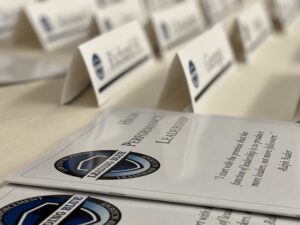Leaders Don’t Train Themselves
By: Andrew A. DeMuth Jr.
“If you expect them to know it, you need to teach it!” After all, leaders don’t train themselves.

Great leaders need great leadership training, and it’s important to seek out training from different sources.
These words should hang in the office of every professional law enforcement trainer as a reminder that training does not end with the range, use-of-force updates, pursuit policies, and the other things we are required to provide training on each year. Our people need training in many other topics as well. One area conspicuously left out of many training programs is leadership.
Leadership is everything to an organization. It is the organization. That crackerjack squad, that outstanding bureau, that premier agency did not happen by accident. They are the result of great leadership.
But great leadership does not develop on its own. While some disagree as to whether leadership is learned or innate, almost all would agree that leadership can be improved through experience and education. It’s simple: if we want great leadership, we must teach great leadership.
As a national trainer, I can attest that very few agencies include leadership as a topic of annual training. I am not talking about periodically sending ranked personnel to a supervisory class or even the FBI Academy; I am referring to reoccurring leadership training within the walls of the annual training program.
We cannot expect great leadership from our supervisors and command staff if we do not first teach great leadership. And once leadership has been taught, it must be frequently reinforced as both an expectation and an obligation. The expectation comes from the agency while the obligation should come internally from the leader. If our training accomplishes its purpose, our people should feel obligated to provide great leadership simply because they have been entrusted with the careers and, in some cases, the lives of their people.
Great leadership training must begin with a discussion on the actual meaning of leadership. In our classes, we define leadership as “the ability to get the best out of your people.” This definition works for every leadership situation, a promise often not kept with other definitions of leadership.
Too often, ranked personnel mistake management as leadership. Handing out shift assignments, deciding which of your people should handle the investigation, or completing a performance evaluation are not leadership tasks; they are management tasks. They are still very important, but they are not examples of leadership.
It is also important to cover leadership concepts that should be included in annual leadership training (and even more frequently, if possible). There are just so many important areas that need to be explored from communication to followership. The goal must be to establish a strong leadership culture. To achieve this, you must sell the benefits of implementing a comprehensive leadership development program within your agency to your people.
Great leadership is about those you lead. Author and speaker Robyn Benincasa once said, “You don’t inspire your teammates by showing them how amazing you are. You inspire them by showing them how amazing they are.” Leadership is about taking your people, your unit, and, ultimately, your organization to the next level.
To achieve this level of leadership at all levels within your organization, you must have an exceptional leadership development program. After all, leaders don’t train themselves.
Back to Law Enforcement Leadership Articles
Andrew A. DeMuth Jr. is the founder of Leading Blue, a firm that provides leadership training for law enforcement and the private sector. He served 32 years in law enforcement with four different agencies in a variety of leadership roles. During his career, he served as an investigation’s commander, range master, agency training officer, press information officer, and director of the youth police academy program. He spent the last seven years of his law enforcement career managing CODIS, the New Jersey DNA program overseeing the processing, compliance, and training of more than 500 participating law enforcement agencies and correctional facilities. Today he serves as an adjunct professor for two institutions and speaks on law enforcement leadership and training topics throughout the country.

